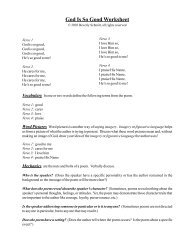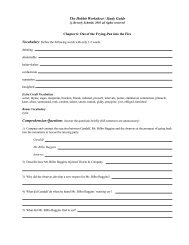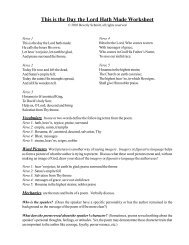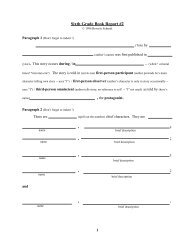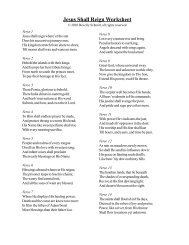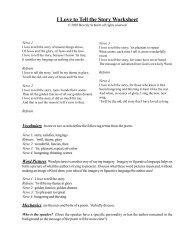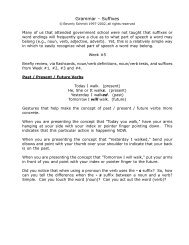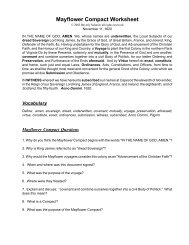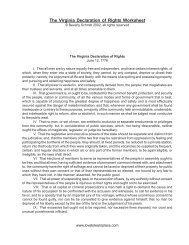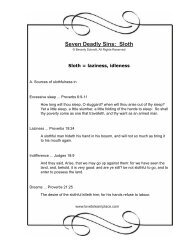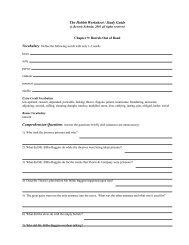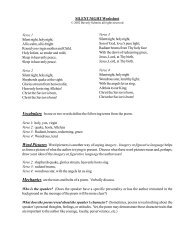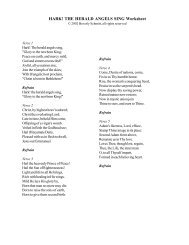Worksheet - Love to Learn Place
Worksheet - Love to Learn Place
Worksheet - Love to Learn Place
Create successful ePaper yourself
Turn your PDF publications into a flip-book with our unique Google optimized e-Paper software.
THE FIRST NOEL <strong>Worksheet</strong><br />
© 2002 Beverly Schmitt, all rights reserved<br />
Verse 1<br />
The first Noel the angel did say<br />
Was <strong>to</strong> certain poor shepherds in fields as they lay;<br />
In fields where they lay tending their sheep,<br />
On a cold winter’s night that was so deep.<br />
Refrain<br />
Noel, Noel, Noel, Noel,<br />
Born is the King of Israel.<br />
Verse 2<br />
They lookèd up and saw a star<br />
Shining in the east, beyond them far;<br />
And <strong>to</strong> the earth it gave great light,<br />
And so it continued both day and night.<br />
Refrain<br />
Verse 3<br />
And by the light of that same star<br />
Three Wise Men came from country far;<br />
To seek for a king was their intent,<br />
And <strong>to</strong> follow the star wherever it went.<br />
Refrain<br />
Verse 4<br />
This star drew nigh <strong>to</strong> the northwest,<br />
Over Bethlehem it <strong>to</strong>ok its rest;<br />
And there it did both s<strong>to</strong>p and stay,<br />
Right over the place where Jesus lay.<br />
Refrain<br />
Refrain<br />
Verse 6<br />
Then entered in those Wise Men three,<br />
Full reverently upon the knee,<br />
And offered there, in His presence,<br />
Their gold and myrrh and frankincense.<br />
Refrain<br />
Verse 7<br />
Between an ox stall and an ass,<br />
This Child truly there He was;<br />
For want of clothing they did Him lay<br />
All in a manger, among the hay.<br />
Refrain<br />
Verse 8<br />
Then let us all with one accord<br />
Sing praises <strong>to</strong> our heavenly Lord;<br />
That hath made heaven and earth of naught,<br />
And with His blood mankind hath bought.<br />
Refrain<br />
Verse 9<br />
If we in our time shall do well,<br />
We shall be free from death and hell;<br />
For God hath prepared for us all<br />
A resting place in general.<br />
Refrain<br />
Verse 5<br />
Then did they know assuredly<br />
Within that house the King did lie;<br />
One entered it them for <strong>to</strong> see,<br />
And found the Babe in poverty.
Vocabulary In one or two words define the following terms from the poem.<br />
Verse 1: Noel, tending<br />
Refrain: Refrain<br />
Verse 3: seek, intent<br />
Verse 4: nigh<br />
Verse 5: assuredly<br />
Verse 6: reverently, myrrh, frankincense<br />
Verse 7: stall, manger<br />
Verse 8: accord, hath, naught<br />
Verse 9: prepared<br />
Word Pictures Word pictures is another way of saying imagery. Imagery or figurative language helps<br />
us form a picture of what the author is trying <strong>to</strong> present. Discuss what these word pictures mean and, without<br />
making an image of Christ, draw your idea of the imagery or figurative language the author uses!<br />
Verse 1: angel did say; poor shepherds in fields as they lay; cold winter’s night<br />
Verse 2: saw a star<br />
Verse 3: Three Wise Men came from country far; seek for a king<br />
Verse 4: Over Bethlehem it [star] <strong>to</strong>ok its rest<br />
Verse 6: Wise Men three; reverently upon the knee; offered ... gold and myrrh and frankincense<br />
Verse 8: Sing praises<br />
Mechanics are the nuts and bolts of a poem. Verbally discuss.<br />
Who is the speaker? (Does the speaker have a specific personality or has the author remained in the<br />
background so the message of the poem will be more clear?)<br />
What does the poem reveal about the speaker’s character? (Sometimes, poems reveal nothing about the<br />
speaker’s personal thoughts, feelings, or attitudes. Yet, the poem may demonstrate those character traits that<br />
are important <strong>to</strong> the author like courage, loyalty, perserverance, etc.)<br />
Is the speaker addressing someone in particular or is it <strong>to</strong> anyone? (Sometimes poems are not directed<br />
<strong>to</strong> anyone in particular, but <strong>to</strong> anyone that may read it.)<br />
Does the poem have a setting? (Does the author tell where the poem occurs? Is the poem about a specific<br />
event? )<br />
Is the poem about a particular event? (Is the event past or present? If it is about a past event, does the<br />
remembrance of the event have a particular meaning <strong>to</strong> the speaker?)<br />
Is the theme of the poem stated directly or indirectly? (Some poems are straightforward and are meant<br />
<strong>to</strong> be taken literally. In songs, the theme may be presented in the refrain or in the last few lines. Sometimes the<br />
© 2002 Beverly Schmitt, all rights reserved
theme is a little bit more difficult <strong>to</strong> discern as it is made with figurative language or symbols.)<br />
What point of view or perspective is the speaker? (What meaning do you think the poem has for the<br />
author?)<br />
How did you respond <strong>to</strong> the poem when you read it the first time? (Did your thoughts and feelings<br />
change after you <strong>to</strong>ok time <strong>to</strong> study it?)<br />
Comprehension Questions Verbally discuss<br />
Verse 1: What appeared <strong>to</strong> the shepherds? Why? Where were the shepherds? What was the message given<br />
<strong>to</strong> the shepherds in the “refrain”?<br />
Verse 2: What did the shepherds see when they looked up? In which direction was it? What did this thing do?<br />
Verse 3: What drew the three wise men? What did they determine <strong>to</strong> do? Why?<br />
Verse 4: What direction did it now lead? What city is mentioned? What did it do over that city?<br />
Verse 5: What did the three wise men “know”? Who or what was located in the “house”? Did the inhabitants<br />
of the “house” appear rich or poor?<br />
Verse 6: What did the three wise men physically do when they entered the “house”? What was offered?<br />
Verse 7: What else was in the “house”? What did the bed consist of?<br />
Verse 8: What does the author say we are <strong>to</strong> do in the first line? Why should praises be sung? According <strong>to</strong><br />
the author, heaven and earth was made out of what? Explain and discuss: “with His blood mankind hath<br />
bought.”<br />
Verse 9: What do you think the author meant by the first two lines? Why? Explain and discuss: “For God hath<br />
prepared for us all, A resting place in general.”<br />
Did this his<strong>to</strong>rical event or message become more real <strong>to</strong> you after reading this poem? Why?<br />
After reading this poem, what character traits did you think of? What does the Bible have <strong>to</strong> say about these<br />
character traits?<br />
What Does the Bible Say?<br />
Find Scripture proofs for each of the assertions or statements made for each of the nine verses and the refrain.<br />
Re-read the Gospel accounts of the Nativity along with Isaiah 53. Discuss how this one birth impacted his<strong>to</strong>ry.<br />
The Author/Poet<br />
Based on what you have studied about this poem so far, would you guess that the author was a Christian or a<br />
humanist? How did you arrive at your decision?<br />
This traditional English carol may be from the 13th century.<br />
© 2002 Beverly Schmitt, all rights reserved
Geography<br />
Locate England on a globe, map and atlas.<br />
Challenge Locate 2 English rivers on a map or in an atlas.<br />
Compare/contrast weather from England with your own for one week.<br />
Make an English meal for your family.<br />
Activities<br />
1) Make your own book! Without making an image of Christ, draw pictures repesenting each verse. (Note:<br />
that will be ten different illustrations). With construction paper and other items readily available at home, make<br />
a title page with the name of the song and the author’s name which will be your book’s cover. You may want<br />
<strong>to</strong> illustrate your cover and include this poem in your book.<br />
2) Make your own play! Re-enact with your siblings or friends the event or message discussed in this poem.<br />
Keep it lively, simple, and short. You may want <strong>to</strong> end your play with singing a rousing chorus of this poem or<br />
reading Scripture verses. Videotape your creation.<br />
3) Radio Drama! With a handheld tape recorder, create your own radio show dramatizing the his<strong>to</strong>rical event<br />
or message of this poem.<br />
4) Be a Reporter! Either with your family camcorder or with a handheld tape recorder, “interview” various<br />
individuals connected with this poem (e.g., G.A. Henty, Agatha Christie, Chris<strong>to</strong>pher Columbus, Queen Isabella,<br />
repentant sinner, etc.). In order <strong>to</strong> have the fast paced style of a reporter, watch and/or listen <strong>to</strong> the news with<br />
your parents’ permission. Keep the interviews lively, quick, and <strong>to</strong> the point.<br />
Remain objective! Being objective means just reporting the facts and not giving your opinion of the situation.<br />
5) What is one of the things you most enjoy? Is it literature? math? science? sports? cooking? Take that area<br />
of interest and relate that <strong>to</strong> this poem. If you enjoy dance, for example, develop a dance routine that physically<br />
expresses the sentiments of this poem. If you enjoy shop, create something out of wood that helps <strong>to</strong> clarify<br />
this poem. Do you enjoy creating s<strong>to</strong>ries? Write a s<strong>to</strong>ry based on any time period you desire that expresses<br />
the sentiments of this poem. Do you enjoy creating things in the kitchen? Make an ancient meal from this time<br />
or develop your own meal that symbolizes the many different points this poem makes.<br />
6) Poster. Create a poster illustrating the the author’s view of the impact of The First Noel.<br />
7) Scavenger Hunt. Go <strong>to</strong> the library <strong>to</strong> learn what you can about John Needham and share it with your<br />
family. If possible, discover the s<strong>to</strong>ry behind this poem.<br />
© 2002 Beverly Schmitt, all rights reserved



